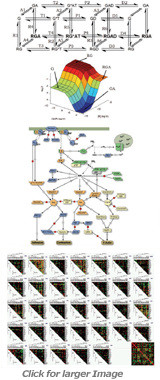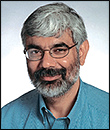Bioinformatics and Systems Biology: At the Crossroads of Biology, Engineering, and Computation
Category
Published on
Abstract
 Traditional biological research has relied on a "deconstructive" mode where piece-wise analysis of the components of complex systems was carried out in detail. The genome projects have spurred the discovery of new genes/molecules to add to the existing inventory of "parts" that make up living entities. With the availability of this information and the development of increasingly powerful tools for global analysis of gene and protein expression (chips/arrays), a "constructionist" bias has begun to appear in biology. There is a growing desire to put integrate the piecewise knowledge and achieve a deeper understanding of how living systems work as total entities. "This attempt to develop a true understanding of how living beings are "engineered" so that the emergent properties of the assembled parts serve the necessary biological functions is known generically as "systems biology."(a quote from Ron Germain at NIH). Further, this understanding and the concomitant measurements provide the basis for quantitative and predictive modeling of biological function at the level of large cellular networks. In this talk I will present how integrated analysis of data can provide insights into various aspects of the intracellular networks. Combining proteomic, small molecule and transcriptional data along with legacy knowledge, we can obtain a more detailed and dynamic picture of the response of a cell to input. Not surprisingly, the biological "context" of the input determines the response and the similarities in cellular responses arise from functional modularity within the networks.
Traditional biological research has relied on a "deconstructive" mode where piece-wise analysis of the components of complex systems was carried out in detail. The genome projects have spurred the discovery of new genes/molecules to add to the existing inventory of "parts" that make up living entities. With the availability of this information and the development of increasingly powerful tools for global analysis of gene and protein expression (chips/arrays), a "constructionist" bias has begun to appear in biology. There is a growing desire to put integrate the piecewise knowledge and achieve a deeper understanding of how living systems work as total entities. "This attempt to develop a true understanding of how living beings are "engineered" so that the emergent properties of the assembled parts serve the necessary biological functions is known generically as "systems biology."(a quote from Ron Germain at NIH). Further, this understanding and the concomitant measurements provide the basis for quantitative and predictive modeling of biological function at the level of large cellular networks. In this talk I will present how integrated analysis of data can provide insights into various aspects of the intracellular networks. Combining proteomic, small molecule and transcriptional data along with legacy knowledge, we can obtain a more detailed and dynamic picture of the response of a cell to input. Not surprisingly, the biological "context" of the input determines the response and the similarities in cellular responses arise from functional modularity within the networks.
Bio
 Shanker Subramaniam is currently a Professor of Bioengineering, Chemistry and
Biochemistry, and Biology at the University of California at San Diego. He
also directs UCSDs Bioinformatics and Computational Biology graduate program
and has an adjunct appointment at the Salk Institute for Biological Studies.
He also has a joint appointment at the San Diego Supercomputing Center. Before
moving to USCD in 1999, he was the Director of the computational biology group
at the National Center for Supercomputing Applications (NCSA) and a Professor
of Biochemistry, Molecular and Integrative Physiology, Chemical Engineering
and Electrical & Computer Engineering at the University of Illinois. His
present research focuses on several important aspects of computational biology
including web-based approaches to bioinformatics, going from protein sequence
to structure and function and studying protein recognition and function.
Shanker Subramaniam is currently a Professor of Bioengineering, Chemistry and
Biochemistry, and Biology at the University of California at San Diego. He
also directs UCSDs Bioinformatics and Computational Biology graduate program
and has an adjunct appointment at the Salk Institute for Biological Studies.
He also has a joint appointment at the San Diego Supercomputing Center. Before
moving to USCD in 1999, he was the Director of the computational biology group
at the National Center for Supercomputing Applications (NCSA) and a Professor
of Biochemistry, Molecular and Integrative Physiology, Chemical Engineering
and Electrical & Computer Engineering at the University of Illinois. His
present research focuses on several important aspects of computational biology
including web-based approaches to bioinformatics, going from protein sequence
to structure and function and studying protein recognition and function.
Subramaniam received a Ph.D. in Chemistry in 1982 from the Indian Institute of Technology. He is a fellow of the American Institute for Medical and Biological Engineering and its recipient of Smithsonian Foundation and Association of Laboratory Automatics Awards.
Sponsored by
Cite this work
Researchers should cite this work as follows:
Time
Location
Kranert Auditorium, Purdue University, West Lafayette, IN